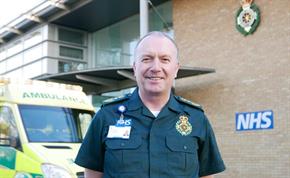
Firstly, I would like to pay tribute to MP Jo Cox who was brutally killed while going about her duties as a public servant. My thoughts have been with her loved ones and I have written to Jo’s husband on behalf of the Trust to offer our condolences. A memorial fund has been set up to raise money for causes that were closest to her heart. If you would like to make a donation, please click here for the Jo Cox fund page.
I’ve spoken before about the ongoing trials within various ambulance services that are looking at how ambulance trusts are measured. These are looking at moving away from blunt tools like response times to more patient-focused measures like clinical outcomes. This is good news and the right thing to do for patients – time should always be a factor where it has a clinical impact on a patient, such as in cases of cardiac arrest, but measuring everything on time is not good for patients, colleagues, or the wider system.
Indeed, Professor Jonathan Benger, who is the National Clinical Director for Urgent Care at NHS England (amongst other roles), said in January:
“We need to get the right resource to the right patients – an appropriate vehicle with a skilled paramedic to the patients that need it in a timely manner. Of particular importance is the need to ensure that the ways in which ambulance services are managed and measured reflect the needs of a 21st century population, and are focused on clinical priorities, rather than response measures alone.
“We have a tendency to send ambulances to patients when we don’t actually know if they need an ambulance or not – we also send multiple vehicles to the same call – there are also other things that start to happen due to the eight minute response – such as sending an fast response unit to stop the clock – and because we are only measuring half the calls the green calls may have very long waits for an ambulance response. These kinds of behaviours are inefficient but in some ways are a logical response to current measurement – we are losing sight of the reason for the service, improving outcomes for patients.”
I also welcome Secretary of State for Health Jeremy Hunt’s recent observation that targets measuring how quickly an ambulance gets to a patient are ‘perverse’. You can read the full article here on the Eastern Daily Press.
It is refreshing to see NHS leaders offer a different perspective on performance which gives us hope that the current targets will change. This is exactly the strategy we are developing - making sure we can get the right response to the patient first time, be that help over the phone, treatment on scene by a skilled clinician, or treating the patient and transporting them to hospital.
However, in the meantime, we continue to be measured on how quickly we reach those patients with potentially life-threatening conditions, and we can’t get away from that. Since I joined the Trust under a year ago, it has become obvious to me that the public, politicians, regulators, commissioners and the media simply want us to meet the performance targets that are currently in place. And this is why we are hopeful of receiving significant investment to increase our capacity this year, to help us improve that performance by investing in increased recruitment and short term measures like private ambulance services (PAS), which I’ve again touched on before.
So we have to improve our performance. The reality is that if we do not address performance, we will not get the support or head space to do the things we want to do in the future like accelerate our clinical focus. It’s not something we should be afraid of talking about, especially as the public and our stakeholders are demanding those improvements and will hold us to account for delivering them. We are making progress and performance is improving, but we need to do more. Thanks to our improvements in performance, we have moved up the ranking by comparison with ambulance services across England. We can all, and by that I mean every single one of us, make a difference to our performance in our own way, which in turn will help us to develop our service for the future; a service that provides better services for patients, and ourselves.
Have a good week,
Robert
Published 23rd June, 2016